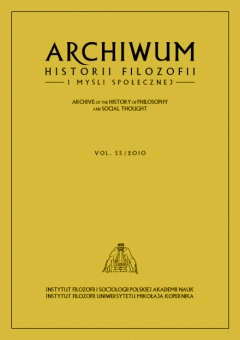Suárez’ Disputationes metaphysicae (1597) und die mittelalterlichen Transzendentalienlehren
Suárez’ Disputationes metaphysicae (1597) and the medieval Doctrines of the Transcendentals
Author(s): Rolf DargeSubject(s): Metaphysics
Published by: Instytut Filozofii i Socjologii Polskiej Akademii Nauk
Keywords: Suárez; transcendentals; Scotus; Disputationes metaphysicae;
Summary/Abstract: According to the prevailing view Suárez’ transcendental theory in the first part of his Disputationes metaphysicae follows the outline of the scotistic scientia transcendens. This view needs some correction: While Suárez adopts the scotistic quidditative and univocal concept of being, he does not follow scotus’ way of thinking in the elaboration of his theory of the transcendentals. Rather by a systematic examination of the scotistic position he develops a new transcendental approach. It contains the program of an inner conceptual explication of the nature of being as such. This program requires to overcome the cognitive models, which are at the base of the scotistic scientia transcendens: the model of composition, which rules the transcendental analysis and the model of real property (proprium, per se accidens) which rules Scotus’ interpretation of the attributes of being as being. These attríbutes (passiones entis) according to Suárez immediately explicate the nature or perfection of being as being. By this assumption – directed against Scotus – Suárez tries to think transcendentality of being in a radical way also in view of the attributes of being as such, and – although these attributes then have to be considered as being only conceptually and not really distinct from being as such – to conserve metaphysics as a scientia realis: by the account of the – only conceptually distinguishable – attributes of being in general metaphysics gives a veritable explication of the real nature of being. In a very similar way the objective and the method of the transcendental explication of being were understood by Aquinas and other medieval authors in the prescotistic tradition of the doctrine of the transcendentals. Suárez consciously takes up this tradition. So it seems that his examination of the scotistic position aims at a competitive alternative theory, which continues and transforms the prescotistic line of transcendental thought on the base of the unified quiditative concept of being. Suá- rez’ transcendental theory therefore may be inscribed in the “Wirkungsgeschichte” (history of effects) of the scotistic as well as of the prescotistic – especially thomistic – doctrine of the transcendentals.
Journal: Archiwum Historii Filozofii i Myśli Społecznej
- Issue Year: 55/2010
- Issue No: 55
- Page Range: 67-90
- Page Count: 24
- Language: Polish

